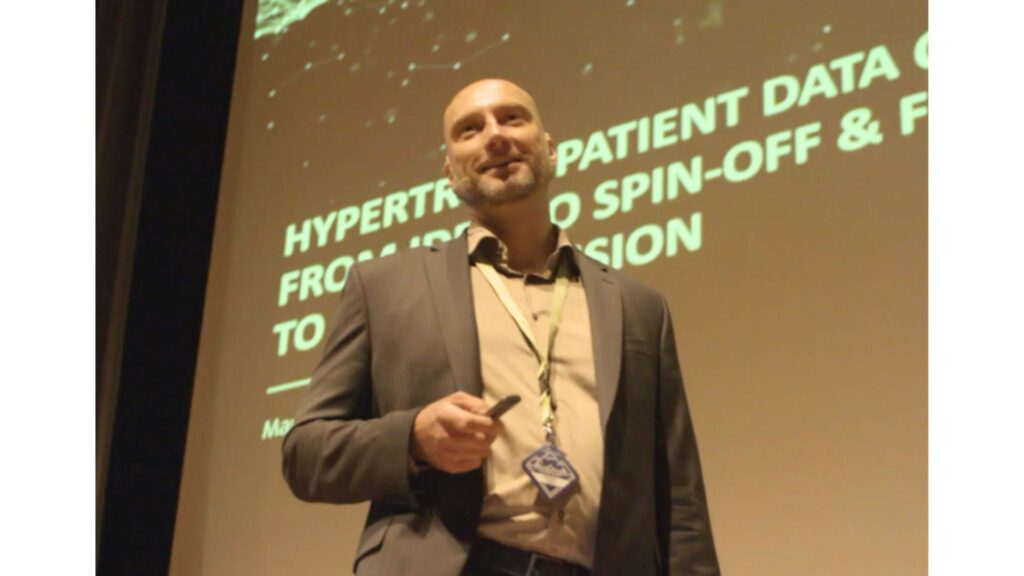
Product Excellence Through Modern PLM in Fast-Paced Markets
Modern PLM systems empower businesses to achieve product excellence in fast-paced markets by enhancing collaboration, agility and innovation.

Starting a business is a thrilling and challenging endeavor that requires commitment, hard work, and perseverance. The journey from idea to start-up is often filled with twists and turns, successes and failures, and a lot of learning along the way. In this article, you will explore Andreas’ journey of creating a digital supply chain solution for personalized medicine, from the initial idea to the final product.
Hi Andreas, thank you for taking the time for a chat. Your journey at Camelot is quite impressive, so why not share it with our readers? How did your journey start and what are you doing now at Camelot?
“My journey with Camelot started in 2016 when I joined the company as a Cloud Architect in the SAP environment. I was keen on exploring innovation, and Camelot seemed like the perfect choice. Since then, my role has certainly evolved. Today, I am the Managing Director of Hypertrust Patient Data Care GmbH, a spin-off of the Camelot Group, which was founded in 2018. So, my story is one that combines the two worlds of digital and biological/pharmaceutical technologies.”
How did your current role come about? How did your idea evolve?
“Well, it all started with a general interest in a technological niche, which was “blockchain” back then. Since I was the only one with experience in this field, I was given the task to dig deeper into it.
The first question that popped into my head was: how can we use blockchain technology in specific value chain use cases? So, we did some research and one specific use case stood out clearly: personalized medicine.
The intersection of healthcare and technology is an ever-evolving space, with new innovations and breakthroughs being made every day. But what happens when you combine the power of an innovative technology with the highly regulated world of pharmaceuticals? This was a highly complex use case that required the interaction of numerous companies and stakeholders, making it a prime candidate for a decentralized approach. As we began to explore this idea further, we were approached by many different companies to consult them on the matter of decentralized systems in healthcare. With the insights into real-world problems came the idea of using blockchain technology to create a decentralized solution for personalized medicine.”
In this process that you just described: How important is it to have a clear use case in mind?
“I would say that this is extremely important. You see, when it comes to emerging digital technologies, it’s easy to get swept up in the hype and forget about the importance of finding the right tool for the job. Therefore, it is crucial to always question whether the tools you’re using are still suitable for the goals you’re pursuing. I realized very quickly that blockchain technology alone was not enough to solve the problem we were trying to address. Obviously, we needed to innovate beyond blockchain, and we did so by developing trusted computing appliances to solve remaining problems.
Especially in industries like personalized healthcare, where the number of involved supply chain parties and the market as such are constantly evolving, it’s not enough to simply develop a solution and hope it will work for everyone. Instead, you must stay nimble and be willing to constantly reevaluate your approach and pivot accordingly – based on your defined use case.”
After hearing that: Did you have to change your approach at any step to get from prototype to product?
“Yes, we did! The initial idea was set up to serve big pharma companies. But we quickly learned that they already had similar solutions in place. So, we shifted our focus to small and medium-sized enterprises, even start-ups. We completely redesigned our platform and tailored it to the needs of the market of our new target group. We chose a lean, cloud-based approach to personalized therapies that emphasizes scalability and affordability. By combining the best features of blockchain technology with a traditional cloud architecture, we were able to offer a solution that is both innovative and practical. One of the key learnings I want to share with you is: if you want to build something new, any new solution, you should always ask yourself if you are building it with the right, necessary tools.”
So, to sum this up, would you say that flexibility and the focus on a clear goal are the key factors of success?
“One hundred percent. Technology should always be seen as a tool to achieve a specific goal. And flexibility is the key to success in a constantly evolving industry – especially in areas like cancer research, where new discoveries are constantly being made. To take one example: The use of open-source technologies can play a big role in achieving this flexibility by allowing developers to innovate and adapt more quickly. They provide a level of flexibility that proprietary software cannot match. For us, at least, the use of this technology has been a key driver of innovation and a key success factor in the development of our solution.
It is equally important to have a clear goal when starting a project. Start with a specific goal and a desire to achieve it. Inevitably, there will be times when you fail along the way. An iterative approach can help keep a project on track, allow for necessary revisions and adjustments, and avoid getting bogged down in details. So ultimately, my personal key to success is being able to adapt and not lose sight of the big picture. But the most important thing I would say is to have a purpose. Because purpose is your personal motivator. And motivation plays a crucial role. The idea of using software to make a difference in the fight against cancer is inherently motivating. I’m a software engineer and suddenly I can help save people. That alone is purpose par excellence and was a decisive factor for our success.”
How did Camelot support you in your innovation journey?
“A lot. When shaping your ideas, the freedom to develop and innovate is essential. At Camelot, we established a culture of innovation. This empowered me to explore new technologies and solutions. I was given the necessary freedom to pursue my vision. Flexibility allowed our team to become experts in our field and analyze the market to tailor our approach. With the ability to pivot and adjust as needed, our strategy became more effective. Ultimately, the freedom to explore and create on our own terms was instrumental to the success.”
Last but not least: Anything else you would like to share with our readers?
“Aim high and go for the complete picture. Don’t start small when pursuing your passion or ideas. If you are still hesitating to position your own idea or struggling to follow your passion: Be bold. Just do it. Accept failures. It’s better to learn from your failures than to never try at all. Become adaptable but remain innovative and creative. It won’t always be smooth sailing. We certainly had to keep questioning our approach, and tools along the way. But in the end, we created a solution we are proud of. Today, we have a successful start-up that is helping to optimize personalized therapies and revolutionize the pharma industry.
Thank you to Camelot for making this possible!
And in my own interest: If I caught your attention with our solution and you can imagine becoming part of it: Reach out to us or be bold and directly apply.”
Thank you, Andreas, for sharing your success story again with us and also with our readers. We wish you continued fun and motivation, but above all success with your spin-off that provides an end-to-end supply chain management solution for advanced and personalized therapies: Hypertrust Patient Data Care | München (hypertrust-patient.com)

Modern PLM systems empower businesses to achieve product excellence in fast-paced markets by enhancing collaboration, agility and innovation.

Read how the Campaign Planner & Designer (CPD) helps you to manage supply chain variability.

Explore automated production planning with our Campaign Planner & Designer.

The pharma market trends impact logistics with a shift to smaller, higher-value shipments and new temperature requirements.
© Camelot Management Consultants, Part of Accenture